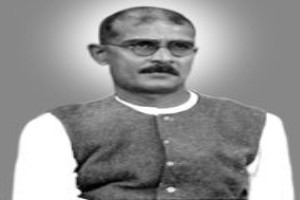
Britain’s Rapacious Policy
 By Mahadev H. Desai*
By Mahadev H. Desai*
(This article was published on July 26, 1921 in Bombay Chronicle)
Whilst the Indian manufactures were effectively prohibited from being imported in England every step was taken to make the British articles a worthy competitor with the Indian. The Indian article was prohibited from being imported, but they did not scruple to import the Indian art of manufacturing that article. I am obliged to the old files of the ‘Modern Review’ for the following quotation from Major J B Keith’s article in the ‘Pioneer’ of September 9, 1891:-
“Everyone knows how jealously trade secrets are guarded. If you went over to Messrs. Doulton’s Pottery Works, you would be politely overlooked. Yet under the force of compulsion, the Indian workman had to divulge the manner of his bleaching and other trade secrets to Manchester. A costly work was prepared by the Indian house department to enable Manchester to take 20 millions a year from the poor of India copies were gratuitously presented to the Chambers of Commerce and the Indian ryot had to pay for them. This may be political economy, but it is marvellously like something else.”
Also read: History Recalled: How India’s industry was ruined – 3
In a passage which has become classical, the historian Horace Hayman Wilson has summed up the result of Britain’s rapacious policy:-
“It is also a melancholy instance of the wrong done by the country on which she has become dependent. It was stated in evidence that the cotton and silk goods of India upto this period (1813) could be sold for a profit in the British market at a price from 50 to 60 per cent lower than those fabricated in England. It consequently became necessary to protect the latter by duties of 70 and 80 per cent on their value or by positive prohibition. Had not this been the case, had not prohibitory duties and decrees existed the mills of Paisley and Manchester would have been stopped in their outset and could scarcely have been again set in motion by the power of steam. They were created by the sacrifice of the Indian manufacture. Had India been independent she would have retaliated, would have imposed prohibitive duties upon British goods, and would thus have preserved her own productive industry from annihilation. This act of self defence was not permitted her; she was at the mercy of the stranger. British goods were forced upon her without paying any duty and the foreign manufacturer employed the arm of political injustice to keep down and ultimately strangle a competitor with whom he could not have contended on equal terms.”
Along with the enforcement of foreign manufacture on the country, and prohibitive duties on exports therefrom, a system of blackmail was maintained to deplete whatever resources had survived the other methods of destruction. There were what is known as the company’s investments. This consisted in employing the revenues on the purchase of Indian goods for exportation and sale in Europe:-
“Thomas Munro deposed that in the Barahishal the company’s servants assembled the principal weavers and placed a guard over them until they entered into engagements to supply the company only …. The sending of a peon meant a fine of one anna a day on the weaver, and the peon was armed with rattan, which was not unoften used to good purpose. Fine was imposed on weavers and their brass utensils were seized for their recovery. The whole weaving population was thus held in subjection to the company’s factories; and Mr. Cox deposed that 1,500 weavers, not including their families and connections were under the authority in the factory over which he presided.” (Dutt)
Every conceivable device was thus employed to destroy India’s manufactures and to drive its poor population to starvation.
Mr. Dutt has given telling summaries of Dr. Buchanan’s ‘Description of the industrial Condition of Northern and Southern India’ just to give an illustration of tracts of land smiling with plenty which have been impoverished and laid to waste. The inquiry was conducted in 1800. We take extracts only relating to weaving and spinning statistics.
In Patna District, with a population of 33 lakhs Dr. Buchanan estimates that there were 3 lakh 30 thousand spinners. The total number of looms employed in the manufacture of chaddars or table cloths was 750, the value of the annual manufacture was Rs. 5,40,000. The greater part of the cotton weavers made course cloth of the value Rs. 24,33,621 annually.
In Shahabad District with a population of 11 lakh there were 1,59,500 spinners. Weavers worked in cotton only. 7,023 houses of weavers had 7,950 looms.
In Bhagalpur district with a population of 20 lakhs, 1,60,000 women used to spin. there were 3,275 looms for Tassar silk weaving. For weaving of cotton cloths there were 7,279 looks.
In Gorakhpur District with a population of 13 lakhs there were 1 lakh 75 thousand spinners, and 6,114 looms. Chintz and blankets were also made.
In Dinajpore District with a population of 80 lakhs, the number of spinners is not known, but the value of total yarn spun was 11 lakh 65 thousand rupees. Maldai cloth consisting of silk warp and cotton woof was woven. There were 800 looms. Cloth woven entirely of silk was woven by some 500 families of weavers and its total manufacture was valued at Rs. 1,20,000. Cotton cloth woven was valued at Rs. 16,74,000.
In Purnea District with a population of 29 lakh, thread worth 13 lakhs of rupees was annually spun, 3,500 looms were employed in weaving fine fabrics and 10,000 were employed on coarse goods.
Equally exhaustive statistics of Southern India are not available, but Dr. Buchanan has observed that places like Bangalore, Tanjore, Coimbatore, Kolagemdu in Malabar were centres of spinning and weaving.
Dr. Buchanan’s Inquiry was undertaken no doubt to examine the condition of the people and to devise measures for improvement thereof. What happened, however? Says Mr. Montgomery Martin:-
“Since this official report (Dr. Buchanan’s inquiries) has made to Government, have any effective steps been taken in England or in India to benefit the sufferers by our rapacity and selfishness? None! on the contrary, we have done everthing possible to impoverish still further the miserable beings subject to the cruel selfishness of English commerce. The pages before the reader prove the number of people in the surveyed districts dependent for thier chief support on their skill in weaving cotton. Under the pretence of free trade, England has compelled the Hindus to receive the products of the steam-looms of Lancashire, Yorkshire and Glasgow etc. at mere nominal prices while the hand-wrought manufacturers of Bengal and Behar, beautiful in fabric and durable in wear, have had heavy and almost prohibitive duties imposed on them.”
Abbe J. A. Durbois, the well-known French missionary and author of “Hindu Manners, Customs and Ceremonies”, who lived in Southern India in intimate touch with the people, has left behind him a graphic description of the desolation prevailing in the villages there at the beginning of the last century. His testimony, as that of an eye-witness of the sufferings of the people, is valuable. He writes:-
“Another serious cause of the poverty of modern India is the decrease in the demand for hand labour, resulting from the introduction of machinery and the spread of manufactures with improved methods in Europe. Just before returning to Europe I travelled through some of the manufacturing districts, and nothing could equal the state of desolation prevailing in them. All the work looms were closed and hundreds of thousands of the inhabitants composing the weaver caste were dying of hunger; for through the prejudices of the country they could not adopt another profession without dishonouring themselves. I found countless widows and other women out of work and consequently destitute, who used formerly to maintain their families by cotton-spinning. Wherever I went the same melancholy picture confronted me. This collapse in the cotton industry has indirectly affected trade in all branches by stopping the circulation of money and the cultivators can no longer reckon on the manufacturers who, in the days of their prosperity, were wont to buy up their surplus grain, and even to lend them money when they were in arrears with their taxes. This has led the cultivators to the hard necessity of relinquishing their grain to and thus becoming the prey of remorseless usurers.
Such is the deplorable condition into which the poor Hindus have sunk; and it grows worse daily, thanks to the much-vaunted improvements in machinery which some nations glory in. Ah! if only the inventors of these industrial developments could hear the curses which this multitude of poor Hindus never tire of heaping upon them! If only like me, they had seen the frightful misery which has overtaken whole provinces, owning entirely to them and their inventive genius, they would no doubt, unless they were entirely wanting in human pity, bitterly repent having carried their pernicious innovations so far, and having thereby enriched a handful of men at the expense of millions of poor people, to whom the very name of their competitors has become odious as the sole cause of their utter destitution!
Mr. Charles Trevelyan who was examined by the House of Commons Committee in 1840 illustrated to what a great extent Indian cotton manufacturers were displaced by English manufactures. “The peculiar kind of silky cotton formerly grown in Bengal from which the fine Dacca muslins used to be made is hardly ever seen; the population of the town of Dacca has fallen from 1,50,000 to 30,000 or 40,000 and the jungle and malaria are fast encroaching upon the town. The only cotton manufactures which stand their ground are of very coarse kinds and the English cotton manufactures are generally consumed by all above the very poorest throughout India. Dacca which was the Manchester of India has fallen off from a very flourishing town to a very poor and small one; the distress there has been very great indeed.”
– To be continued
Mahadev Desai was an eminent freedom fighter and Mahatma Gandhi’s personal secretary; article courtesy his grandson, Nachiketa Desai





